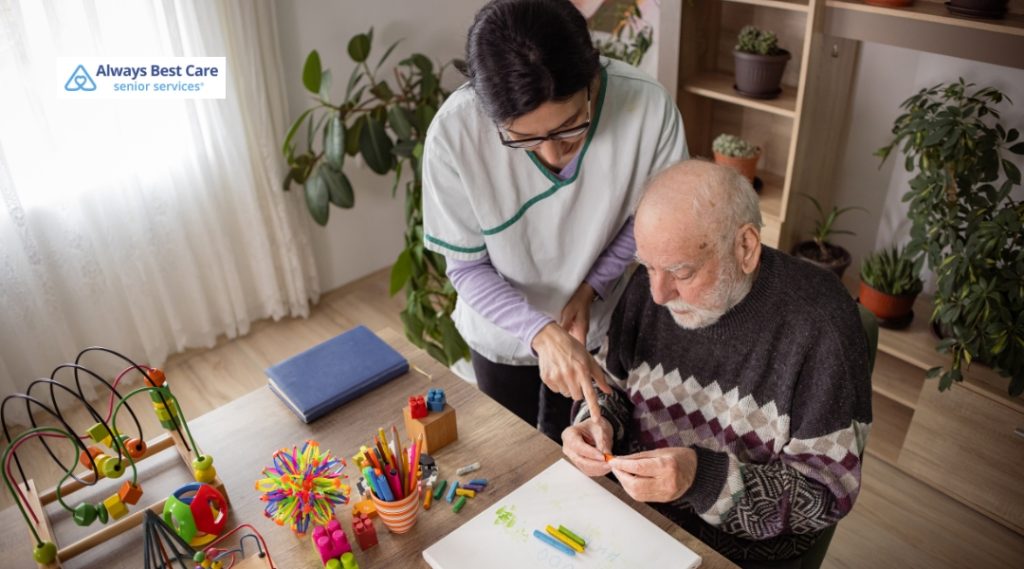Early Signs of Dementia You Shouldn’t Ignore

Aging gracefully comes with its quirks—like occasionally forgetting where you put your glasses or mixing up names at a family gathering.
But sometimes, these little slip-ups might hint at something more serious: early signs of dementia.
Knowing when to raise an eyebrow and take action can make all the difference for our loved ones in Greater Nashville.
We’re here to help you tell the difference between normal forgetfulness and warning bells that shouldn’t be ignored.
What you will learn:
- How to distinguish between normal age-related forgetfulness and the early warning signs of dementia that may impact daily life and independence.
- The most common early symptoms of dementia.
- Why early detection is crucial for accessing timely diagnosis, effective care options, and planning ahead for your loved one’s well-being.
- How compassionate in-home care from Always Best Care of Greater Nashville can help families by providing daily assistance, companionship, and peace of mind throughout the dementia journey.
Table of Contents
Normal Aging vs. Early Signs of Dementia: What Sets Them Apart?
First off, let’s clear up some confusion. Forgetting a phone number or where you left your keys now and then is pretty standard as we get older—it happens to all of us! Usually, those memories bounce back after a moment’s thought, and daily life goes on without much fuss.
But when memory issues start messing with everyday tasks—like paying bills or preparing meals—or conversations become frustratingly difficult, that’s when it’s time to sit up and take notice. Early dementia isn’t just about forgetfulness; it chips away at reasoning, judgment, communication skills, and even personality.

7 Key Early Signs of Dementia You Can’t Afford to Miss
Here are some red flags we’ve noticed that often show up before things get more serious:
- Memory Loss That Interrupts Daily Life: Forgetting appointments repeatedly or asking for reminders on things they used to handle effortlessly signals trouble ahead.
- Trouble Completing Everyday Tasks: Struggling with familiar activities like cooking a favorite recipe or using household gadgets may mean that concentration is slipping.
- Difficulty Finding Words or Following Conversations: Pausing too long mid-sentence, repeating themselves often, or losing track during chats could indicate cognitive decline.
- Poor Judgment Calls: From giving away money impulsively over the phone to dressing unsuitably for weather conditions, these choices might seem out of character but are common warning signs.
- Confusion About Time & Place: Getting lost in once-familiar neighborhoods or mixing up dates can be distressing indicators not to overlook.
- Mood Swings & Personality Changes: Noticeable shifts toward irritability, withdrawal from social circles, depression—even anxiety—are part of this unsettling picture.
- Misplacing Items in Odd Places & Losing Track When Retracing Steps: Putting keys in the fridge? That kind of misplacement, combined with inability to retrace steps, is more than just being scatterbrained.
When Should We Step In?
If any combination of these symptoms rings true for someone close by here in Greater Nashville—or anywhere, really—it’s time for a chat with their healthcare provider. An early diagnosis opens doors: better treatment options down the line, plus peace of mind through planning ahead.

How Always Best Care Can Support Your Loved One Through These Challenges
Caring for someone showing early signs isn’t exactly a walk in Centennial Park—it can wear on families emotionally as well as physically. That’s why having compassionate support right at home makes such a huge difference!
Our caregivers know how subtle changes can signal bigger concerns—and keep you looped in every step along the way. They’re trained not only to assist with daily routines but also encourage mental engagement—all while providing companionship so your loved one doesn’t feel alone facing these changes.
Knowing there’s someone experienced around means families breathe easier knowing safety nets are firmly woven into day-to-day life without taking away independence unnecessarily.
FAQ
Q: How do I know if my loved one’s forgetfulness is normal aging or dementia?
A: Normal aging involves occasional lapses like forgetting names briefly but recalling them later; dementia-related memory loss disrupts daily tasks consistently.
Q: Can mood swings really be an early sign?
A: Yes! Sudden irritability or withdrawal from social activities often accompanies cognitive decline.
Q: Is it possible for younger people under 65 to develop dementia?
A: Early-onset forms, although less common, exist, starting sometimes even before age 65.
Q: What should we do if we suspect dementia symptoms?
A: Seek professional evaluation promptly; earlier detection helps manage progression better.
Q: How does in-home care help those showing signs?
A: Caregivers assist safely while promoting independence through support tailored specifically to the needs experienced during cognitive challenges.

Schedule Your Free Care Consultation with Always Best Care of Greater Nashville!
Concerned about memory changes in someone you care about, don’t wait to take action. Contact Always Best Care of Greater Nashville at (615) 678-0293 for a care consultation. Our experienced team can help you understand your options and create a care plan tailored to your loved one’s unique needs. Early support matters—and you don’t have to navigate it alone.





